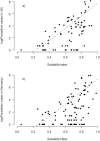Characteristics determining host suitability for a generalist parasite
- PMID: 29674671
- PMCID: PMC5908913
- DOI: 10.1038/s41598-018-24627-1
Characteristics determining host suitability for a generalist parasite
Abstract
Host quality is critical for parasites. The common cuckoo Cuculus canorus is a generalist avian brood parasite, but individual females show strong preference for a specific host species. Here, we use three extensive datasets to investigate different host characteristics determining cuckoo host selection at the species level: (i) 1871 population-specific parasitism rates collected across Europe; (ii) 14 K cases of parasitism in the United Kingdom; and (iii) 16 K cases of parasitism in Germany, with data collected during the period 1735-2013. We find highly consistent effects of the different host species traits across our three datasets: the cuckoo prefers passerine host species of intermediate size that breed in grass- or shrubland and that feed their nestlings with insects, and avoids species that nest in cavities. Based on these results, we construct a novel host suitability index for all passerine species breeding in Europe, and show that host species known to have a corresponding cuckoo host race (gens) rank among the most suitable hosts in Europe. The distribution of our suitability index shows that host species cannot be classified as suitable or not but rather range within a continuum of suitability.
Conflict of interest statement
The authors declare no competing interests.
Figures



Similar articles
-
The common redstart as a suitable model to study cuckoo-host coevolution in a unique ecological context.BMC Evol Biol. 2016 Nov 25;16(1):255. doi: 10.1186/s12862-016-0835-5. BMC Evol Biol. 2016. PMID: 27887566 Free PMC article.
-
Constraints on host choice: why do parasitic birds rarely exploit some common potential hosts?J Anim Ecol. 2011 May;80(3):508-18. doi: 10.1111/j.1365-2656.2010.01798.x. Epub 2011 Jan 18. J Anim Ecol. 2011. PMID: 21244420
-
To eject or to abandon? Life history traits of hosts and parasites interact to influence the fitness payoffs of alternative anti-parasite strategies.J Evol Biol. 2006 Sep;19(5):1585-94. doi: 10.1111/j.1420-9101.2006.01124.x. J Evol Biol. 2006. PMID: 16910987
-
Polymorphism at the nestling stage and host-specific mimicry in an Australasian cuckoo-host arms race.J Anim Ecol. 2023 Jan;92(1):30-43. doi: 10.1111/1365-2656.13849. Epub 2022 Dec 11. J Anim Ecol. 2023. PMID: 36426636 Review.
-
Cuckoos versus hosts in insects and birds: adaptations, counter-adaptations and outcomes.Biol Rev Camb Philos Soc. 2011 Nov;86(4):836-52. doi: 10.1111/j.1469-185X.2010.00173.x. Epub 2011 Jan 12. Biol Rev Camb Philos Soc. 2011. PMID: 21223481 Review.
Cited by
-
Dynamics of evolutionary succession and coordination between opposite adaptations in cuckoo hosts under antagonistic coevolution.Commun Biol. 2024 Apr 3;7(1):406. doi: 10.1038/s42003-024-06105-9. Commun Biol. 2024. PMID: 38570618 Free PMC article.
-
Experimental evidence that host choice by parasites is age-dependent in a fish-monogenean system.Parasitol Res. 2022 Jan;121(1):115-126. doi: 10.1007/s00436-021-07356-9. Epub 2021 Nov 10. Parasitol Res. 2022. PMID: 34755222
-
Asian koel rapidly locates host breeding in novel nest sites.Ecol Evol. 2024 Apr 29;14(5):e11345. doi: 10.1002/ece3.11345. eCollection 2024 May. Ecol Evol. 2024. PMID: 38694758 Free PMC article.
-
Host alarm calls attract the unwanted attention of the brood parasitic common cuckoo.Sci Rep. 2019 Dec 6;9(1):18563. doi: 10.1038/s41598-019-54909-1. Sci Rep. 2019. PMID: 31811179 Free PMC article.
-
Host specificity pattern and chemical deception in a social parasite of ants.Sci Rep. 2019 Feb 7;9(1):1619. doi: 10.1038/s41598-018-38172-4. Sci Rep. 2019. PMID: 30733477 Free PMC article.
References
-
- Combes, C. Parasitism. The ecology and evolution of intimate interactions. (The University of Chicago Press, 2001).
-
- Smith C, Reynolds JD, Sutherland WJ, Jurajda P. Adaptive host choice and avoidance of superparasitism in the spawning decisions of bitterling (Rhodeus sericeus) Behav. Ecol. Sociobiol. 2000;48:29–35. doi: 10.1007/s002650000212. - DOI
-
- Mills SC, Reynolds JD. Host species preferences by bitterling, Rhodeus sericeus, spawning in freshwater mussels and consequences for offspring survival. Anim. Behav. 2002;63:1029–1036. doi: 10.1006/anbe.2001.1988. - DOI
Publication types
MeSH terms
Associated data
LinkOut - more resources
Full Text Sources
Other Literature Sources

